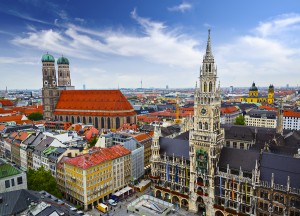Germany’s Ministry of the Economy announced Tuesday that the country will grow by 1.8 percent and continue that growth by two percent throughout next year. Europe’s largest economy slowed down last year and grew by just 0.4 percent because of a paucity of investment by private firms and diminished exports.
The greatest contributor to economic growth will be domestic demand, which will rise by 1.9 percent this year and by another 2.1 percent in 2015 because households will be spending more and there will be heightened investment in construction and equipment.
 According to the government’s projections, Germany’s exports should generate some momentum and increase by 4.1 percent due to the region’s improving economy. It is also predicted to jump by an additional 4.6 percent next year.
According to the government’s projections, Germany’s exports should generate some momentum and increase by 4.1 percent due to the region’s improving economy. It is also predicted to jump by an additional 4.6 percent next year.
When it comes to wages, the ministry expects them to rise. In addition, Germany believes the unemployment rate will fall to 6.7 percent this year and 6.6 percent next year. This is a completely different story than in some of the other eurozone countries, including Greece and Spain, two states that have been severely struggling.
The figures are similar to the Bundesbank’s – the nation’s central bank – numbers which cited growth of 1.7 percent and then two percent next year. The European Commission, meanwhile, also shows growth rates of 1.8 percent this year and two percent in 2015.
“Growth has a broad and stable basis. The driving force is domestic demand,” said German Economy Minister Sigmar Gabriel in a statement. “The driving force is domestic demand, continued favourable developments on the labour market, strong increases in household income, positive business sentiment and rising investment.”
However, officials warn that Ukraine is being closely monitored by political and financial analysts and whatever transpires in Kyiv will have a great impact on both Germany and the eurozone’s economies.
The crisis in Ukraine is affecting the investment sector in Germany because it maintains extensive business and energy relationships with both Russia and Ukraine. This month’s economic survey showed that investor sentiment – Economic Sentiment Index – dropped to its lowest level in eight months, suggesting that many are frightened by the current domestic and international strife in the region.
Russia’s economy, though, has taken a hit from the turmoil taking place in Ukraine. Economy Minister Alexei Ulyukayev said Moscow’s economy grew by only 0.8 percent in the first quarter of the year, a much lower number than the predicted 2.5 percent.
Sanctions applied by the European Union and the United States have been confined to Russian politicians, but investors fear that they might expand to the entire country and hurt the overall economy – investments declined by 4.8 percent in the past three months alone.
According to the World Bank, any escalation in the Ukraine crisis as well as enhanced sanctions could lead to Russia’s economy contracting by 1.8 percent this year. But Russia is attempting to fight back against the sanctions.
Ulyukayev noted that Russia is mulling the possibility of launching a lawsuit against the U.S. in the World Trade Organization (WTO) over sanctions that have hit Russian financial institutions.
“The WTO gives us some additional possibilities,” Ulyukayev was quoted by Interfax as saying on Wednesday. “We at the WTO council in Geneva talked about the possibility of filing lawsuits against the U.S. over the sanctions against Russian banks and we hope to use the mechanism of the WTO to keep our partners in check regarding this issue.”
The U.S. State Department has yet to respond to the threats.



